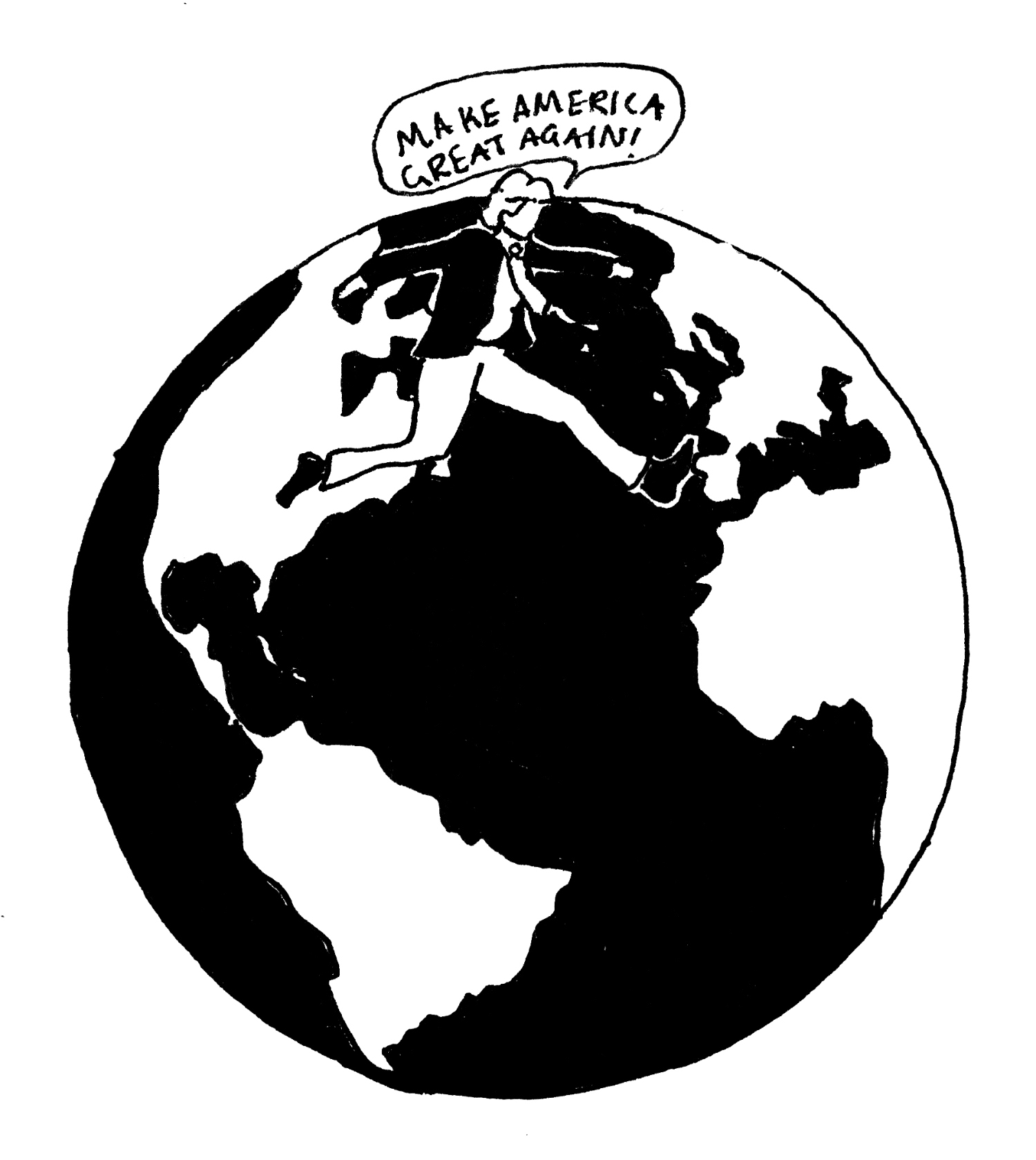The need for a Trump doctrine and consistency in international affairs
April 21, 2017
 This
piece represents the opinion of the author
s.
This
piece represents the opinion of the author
s.
On March 8, 1983, President Ronald Reagan declared the Cold War rivalry a “struggle between right and wrong,” and warned against “the aggressive impulses of [said] evil empire.” The message was clear: Communism would not stand. Eight years later the Soviet Union collapsed and Margaret Thatcher praised how Reagan’s win was accomplished “without firing a shot.” American credit for Soviet collapse is contested; the strength of Reagan’s foreign policy is not. Pledging and ready with resolute economic, military and diplomatic action, The Great Communicator’s stern rhetoric always commanded respect.
President Barack Obama’s rhetoric captivated and inspired Americans, placing him among the greatest of American communicators. From his defining 2004 Democratic National Committee speech to his farewell address in Chicago, patriotism, historic references and biblical allegories abounded. Obama continued his lofty rhetoric pertaining to America’s role in the world: “The United States of America will not be distracted or deterred from what must be done. We are heir to a proud legacy of freedom and we are prepared to do what is necessary to secure that legacy for generations.” Obama spoke with authority when condemning Russian annexation, North Korean nuclear posturing and Syrian chemical weapons use. Yet the autocrats and their policies remained in place and the president’s lofty rhetoric proved hollow.
In between condemnation, calls for coalition building and diplomacy, the Putin, Kim Jong-un and Assad regimes continued their barbarity unabated, even emboldened. Obama referenced an “arc of the moral universe,” and labeled his opposition on the “wrong side of history.” These quotes, powerful and reassuring as they were, obviate action and foster complacency from the benevolent. If the universe has a moral arc and history has right and wrong sides, no one needs promote freedom, equality or justice as time alone will conquer evil. Students of history realize the necessity of unwavering resistance to end slavery, the Holocaust, American subjugation by Britain and the countless smaller transgressions committed by bullies and criminals daily. Diplomacy, prudence and consensus are crucial but expendable when they negate standards, principles and promises. Red lines cannot be crossed without consequences, or they lose all meaning.
President Donald Trump’s rhetoric is the full repudiation of all things Obama. Often divisive and volatile, Trump offers general claims and absolute promises. Historical references and biblical allegory give way to poll numbers and personal slanders. On the campaign trail Trump promised “America First” in foreign affairs: “We will stop racing to topple foreign regimes that we know nothing about, that we shouldn’t be involved with.” In power, the administration has pursued and threatened further unilateral action, and refined the necessity of American leadership and the necessity of a growing military.
The Tomahawk and MOAB strikes in past weeks were largely welcomed by the international community. No longer “leading from behind,” Trump’s actions represent an appropriate redirection and characterize an administration unafraid of engagement, but are dangerously erratic nonetheless. Commentator Charles Krauthammer writes “It took Obama 10 months to decide what to do in Afghanistan. It took Trump 63 hours to make Assad pay for his chemical-weapons duplicity.” While the strikes were largely warranted, their goal and wider purpose do not fit into a grander foreign policy narrative. The Trump administration previously promised no action against Syrian regime as it was not America’s “problem.” Between Secretary Rex Tillerson’s and Ambassador Nikki Haley’s contradicting statements, America remains unsure whether their country stands for Syrian regime change.
Obama’s foreign policy coupled soaring and clear rhetoric with persistent inaction. Trump displays clear action without following any larger strategy or long term goals. Without explicit and coherent objectives, success is impossible to measure or achieve. Incoherent rhetoric and passivity both degrade the trust of our allies and embolden our enemies.
A consistent and moral doctrine, and the perceived willingness to use appropriate force, garners a respect for rhetoric that supersedes the necessity of force. Reagan’s “peace through strength,” Theodore Roosevelt’s “speak softly, yet carry a big stick,” and the concept of Mutually Assured Destruction kept us out of major conflicts and stabilized the world. The stakes and threats of those times exceeded today’s, yet our perceptions of helplessness, malaise and an outright confusion for international affairs thrive.
Increasing chaos, fear and volatility internationally coincide with the lack of a coherent American foreign policy doctrine. When we reverse, ignore or lack a consistent course in foreign policy we communicate ambivalence and vulnerability to our enemies and the world.
The recent lack of coherent American foreign policy can be largely attributed to negativity at home. Whether intervening or not, Americans find perpetual guilt and flaws in our nation’s actions or lack thereof. Intervention in Iraq and Afghanistan and abstention from Rwanda together cast a long shadow over policy makers.
Increased access to information has reduced our patience for prolonged conflict yet brought the terrible atrocities of terrorism and tyranny daily to screens at home. Post-9/11 fervor pushed America into the Iraq and Afghanistan wars. The slow progress—if not outright failure—of democratic nation building catalyzed support for American withdrawal. With the dust settling, the wars have been labeled unnecessary and shameful, our withdrawal premature and we even receive partial credit for creating ISIS. With such immense power, America appropriately faces great scrutiny and examination. Nonetheless, the wrath of impatient, angry and fickle voters has confounded, obstructed and paralyzed our politicians and policy. So long as we chastise foreign intervention yet refuse to accept the consequences of inaction, our government will pursue a strange middle ground of inconsistencies and ambiguity. So long as we berate our every international policy, America remains damned if we do and damned if we don’t.


Comments
Before submitting a comment, please review our comment policy. Some key points from the policy: